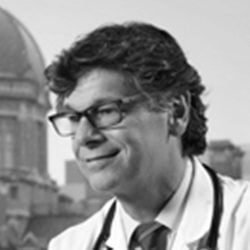What You Need to Know Before Seeing a Naturopath
Updated: Apr. 09, 2021

Taking the natural approach to your health can be a good move—but do your homework first. Here's everything you need to know before making an appointment with a naturopath or a naturopathic doctor.
What is a naturopath?
One category of naturopathic practitioner, a naturopath, practices an alternative form of medicine that focuses on diet, stress reduction, herbal remedies, and natural therapies. Naturopaths may prescribe—or specialize in—massage therapy, acupuncture, or more traditional forms of medicine. Their training and education requirements can vary from state to state, but those programs are not recognized by the U.S. Department of Education for accreditation, and these practitioners are often not available to be licensed, per the National Center for Complementary and Integrative Health. Check out this A-to-Z guide to home remedies that are proven to work.
Naturopathic doctors can be licensed
Although there are no licensing requirements for calling oneself a naturopath, to earn the title of naturopathic doctor (ND), a healer must get training in a doctoral program through an institution that is accredited by the Council of Naturopathic Medical Education, according to the Association of Accredited Naturopathic Medical Colleges (AANMC). Licensed naturopathic doctors must also pass a two-part Naturopathic Physicians Licensing Exam.
Naturopathic doctors have a unique approach
“Naturopathic physicians are trained as primary care providers who diagnose, treat, and manage patients with acute and chronic conditions, while addressing disease and dysfunction at the level of body, mind, and spirit,” says naturopathic doctor JoAnn Yanez, executive director of the AANMC and chair of the Academic Collaborative for Integrative Health. “Naturopathic medicine specifically focuses on treating the whole person, not just symptom management, to achieve total body wellness by getting to the root of the issue,” she says. Beware of these 12 trusted home remedies that will only make your condition worse.
Certain states have more regulation than others
According to the AANMC, states and territories that require NDs to have licenses and follow regulations include Alaska, Arizona, California, Colorado, Connecticut, Washington, D.C., Hawaii, Idaho, Kansas, Maine, Maryland, Massachusetts, Minnesota, Montana, New Hampshire, New Mexico, North Dakota, Oregon, Pennsylvania, Rhode Island, Utah, Vermont, Washington, Puerto Rico, and the U.S. Virgin Islands.
Naturopathic doctors can specialize
Yanez says that NDs primarily practice in outpatient settings and “may specialize in areas including oncology, pediatrics, geriatrics, endocrinology, environmental medicine, and gastroenterology.” The scope of practice may vary among states and provinces, she adds. Depending on the state, some NDs can perform minor surgery (such as stitches or removing a mole). Learn about 14 medicinal herbs you can grow.
You can expect your first visit with an ND to last 60 to 90 minutes
Since naturopathic doctors will consider your entire lifestyle, they’ll want to spend a lengthy period of time with you, says the AANMC. You can expect the ND to ask you about your sleep patterns and your diet; check the appearance of your eyes, skin, hair, and nails; and ask what medications you’re currently taking. This will help the naturopathic doctor develop a personalized plan that will include diet changes, exercise, stress-reduction techniques, and any herbs or vitamin supplements, depending on your health goal.

NDs operate on six fundamental principles
“At the core of naturopathic medicine is the belief in six guiding principles,” says Yanez. These are: trust the healing power of nature; look beyond symptoms to identify—and treat—the source of illness; do no harm by finding the least invasive therapy; educate on healthy behaviors; treat the whole person; and focus on overall wellness and prevention. Read about these 17 natural cold and flu remedies.
Most people see NDs for gastrointestinal disorders and nutritional concerns
According to a 2015 AANMC survey, most patients who seek the care of an ND are battling digestive disorders like irritable bowel syndrome and nutritional concerns. “Increasingly, patients are seeking out health providers who are knowledgeable about a more organic and natural lifestyle in everything from cooking to medicine,” Yanez explains.
Your first stop should be an MD or DO
“If someone has a health question or issue, they need to go see an MD,” says Leonard D. Reeves, MD, a family physician and associate dean of the Northwest Clinical Campus of the Medical College of Georgia in Rome, and a member of the American Academy of Family Physicians board of directors. “Naturopaths do not undergo the same kind of training, and they do not have an education that covers the scope and quality of medical illness, disease, and care that an MD or DO (doctor of osteopathic medicine) would hold,” he says. Check out these 9 facts about alternative medicine your doctor desperately wants you to know.
ND treatments usually aren’t FDA-approved
Dr. Reeves says it’s important to remember that although naturopathic doctors may go through their own schooling and licensing, it’s very different from the training and licensing one goes through in a standard medical school. Most naturopathy treatments also haven’t undergone rigorous scientific testing, he explains.
NDs may not know your entire health history
Ideally, your primary care physician will work with your ND to help you get the best care. “Your family physician is there for every stage and phase of life,” Dr. Reeves points out. “Don’t keep it from your physician that you’re seeing a naturopath. Be honest with your physician—they are there to help you,” he says. Note the 17 common lies people tell their doctors.
You should keep track of the herbs and supplements the ND prescribes
Some natural therapies and treatments—herbs and supplements—can interfere with your prescription medications. They may even worsen your condition, Dr. Reeves warns. He adds that most family physicians are aware of the alternative-medicine aspects of treatment, and your doctor, your ND, and your pharmacist need to know everything you’re taking. Check out 7 natural remedies doctors actually recommend.

